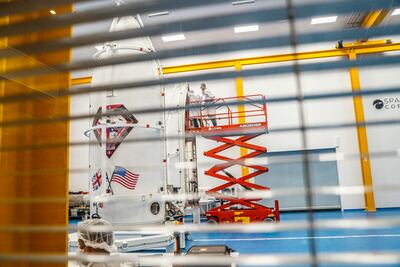Unless new rules are agreed in a new global treaty, space risks being turned into a “man-made rubbish dump”, the chairman of the UK Space Agency has said.
Lord David Willetts also warned that launching satellites would become “trickier and trickier” if immediate steps were not taken to control space debris.
He praised British industry for its innovation in creating new spacecraft that will help clear up the rubbish and repair failing satellites.
But without prompt action the world risks “trashing” space, with already 7,000 satellites in orbit above Earth, he said.

“We think of space as somehow pure or pristine or clear and yet we're in danger of trashing it and making another man-made rubbish dump,” he told the Global Network On Sustainability In Space (GNOSIS). “We're very concerned as well about access to space as space debris will make launching missions in the future trickier and trickier.”
There are mounting worries that increasing space debris could lead to a catastrophe called the Kessler Effect, where a chain reaction of collisions would make it impossible to navigate any spacecraft and knock out global satellite systems.
Lord Willetts outlined a concern highlighted by the UK’s leading astronaut, Tim Peake, who spent six months on the International Space Station. “Tim said in some ways the scariest thing you did was not the launch, not the return, but the times when in the space station they were asked to go into their Soyuz [escape] modules in case space debris, damaged the space station itself.”
The former science and universities minister was speaking on Thursday at the second GNOSIS conference, that brought academics and industry together to discuss cosmic debris and protecting spacecraft.

He lamented the lost opportunity to introduce new rules for space at the 50th anniversary of the Outer Space Treaty due to poor relations between the US and Russia. The 1967 agreement forms the basis of international space law and currently 112 countries are parties to the treaty,
Lord Willetts said it could have been a moment to “upgrade and modernise the overall international legal framework within which we operate”, but unfortunately bad international relations ruled it out.
Given Russia’s invasion of Ukraine the possibility of an international agreement is now even more difficult.
The UAE, which signed the Outer Space Treaty in 2000, has a burgeoning and responsible space programme with plans to send its Rashid rover to the moon later this month, after the SpaceX Falcon 9 rocket had to cancel its launch on Thursday.
Britain’s own industry is growing dramatically with the first aircraft-assisted launch of a satellite from Spaceport Cornwall potentially later this month, and next year the inaugural blast-off of a vertical rocket from the Saxavord space centre in Scotland.

“We see our space launch capability as really helping tackle some of those challenges of space debris removal and in-orbit servicing,” said Lord Willetts.
“There's a sense that the UK is really a constructive contributor to a global problem. We're trying to do it through technologies, through international activity and by making the UK a clear leader in shaping responsible space law.”
He also praised the work of the UK-based Astroscale company that says it is the first with a vision for the safe development of space “for the benefit of future generations” including in-orbit repair.

“I suspect in the future there will be more and more capacity to repair broken or malfunctioning satellites,” said Lord Willetts, 66. “And Astroscale is a really exciting company moving beyond active debris removal into in-orbit servicing as well. That is another area where British companies are keen to attract companies around the world.”
He also proposed that the military’s early ballistic missile warning station at Fylingdales in Yorkshire should have its immense capabilities freely available to all, to track “space situational awareness”.
Fylingdales has a secondary function of detecting orbiting objects making it ideal to track debris. “Sustainability in space is crucial and we try to support that through the UK Space Agency,” Lord Willetts said.


